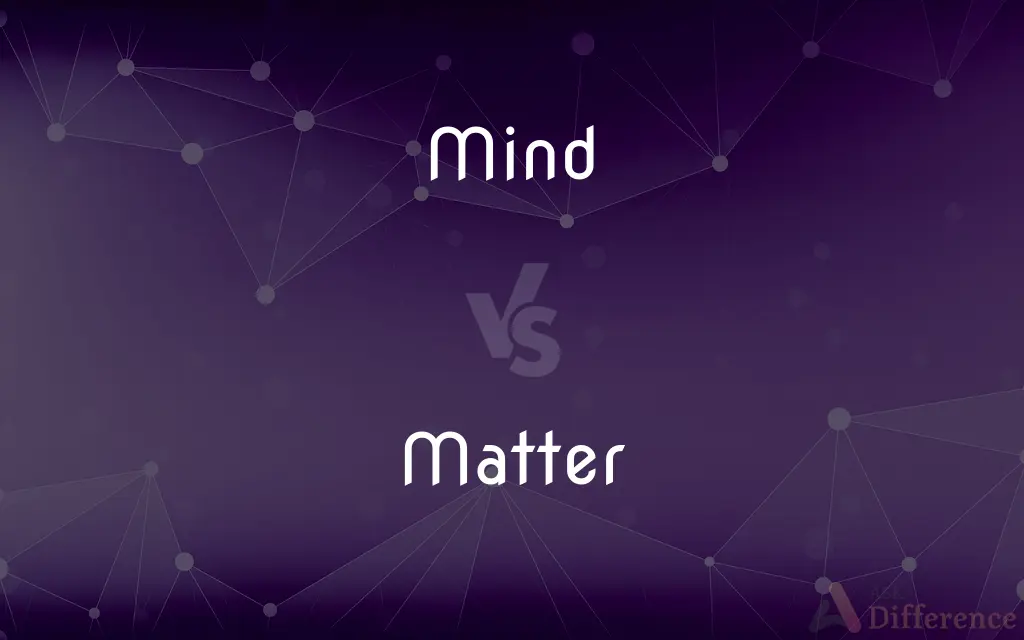Mind vs. Matter — What's the Difference?
Edited by Tayyaba Rehman — By Fiza Rafique — Updated on February 27, 2024
Mind refers to the cognitive aspects of consciousness, including thoughts and emotions, whereas matter is the physical substance that constitutes the observable universe and has mass and occupies space.

Difference Between Mind and Matter
Table of Contents
ADVERTISEMENT
Key Differences
The mind encompasses the intangible aspects of our being, such as thoughts, feelings, and consciousness, making it central to our subjective experiences. It is where cognitive functions occur, from problem-solving to dreaming. Matter, on the other hand, is tangible and measurable, forming the physical basis of the universe, including everything from stars to the human body.
The mind is often studied within the fields of psychology and neuroscience, focusing on understanding mental functions and behaviors, matter is primarily the concern of physics and chemistry, which examine its composition, properties, and the laws governing it.
The concept of mind involves abstract entities like ideas and beliefs, which do not occupy physical space and are not subject to physical laws. Conversely, matter is defined by its physical properties such as mass, volume, and its interactions with energy and forces.
The distinction between mind and matter is a fundamental question in philosophy, especially in metaphysics and the philosophy of mind. It raises debates about consciousness, the nature of reality, and whether mental phenomena can be reduced to physical processes.
The interaction between mind and matter is evident in how our thoughts and emotions can influence our physical state, and vice versa, highlighting a complex relationship that science and philosophy continue to explore.
ADVERTISEMENT
Comparison Chart
Nature
Intangible, cognitive
Tangible, physical
Study Field
Psychology, Neuroscience
Physics, Chemistry
Constituents
Thoughts, emotions, consciousness
Atoms, molecules, subatomic particles
Occupies Space
No
Yes
Subject to Physical Laws
No
Yes
Compare with Definitions
Mind
Subconscious.
The subconscious mind influences our behavior without our awareness.
Matter
Chemical Properties.
The study of matter involves understanding its chemical properties and reactions.
Mind
Beliefs and Ideas.
A person's beliefs and ideas are products of their mind.
Matter
States of Matter.
Water can exist in three states of matter. solid, liquid, and gas.
Mind
Cognitive Functions.
The mind's cognitive functions include memory, perception, and decision-making.
Matter
Physical Substance.
Matter constitutes everything physically real around us, like water and rocks.
Mind
Emotional State.
Happiness or sadness reflects the mind's emotional state.
Matter
Mass and Volume.
All matter has mass and occupies space.
Mind
Consciousness.
Consciousness is the awareness the mind has of itself and the world.
Matter
Energy Interaction.
Matter interacts with energy in processes like photosynthesis and combustion.
Mind
The mind is the set of faculties responsible for mental phenomena. Often the term is also identified with the phenomena themselves.
Matter
(uncountable) Material; substance.
Mind
The faculty of a human or other animal by which it thinks, perceives, feels, remembers, or desires
Studying the relation between the brain and the mind.
Matter
(physics) The basic structural component of the universe, usually having mass and volume.
Mind
A person of great mental ability
The great minds of the century.
Matter
(physics) Matter made up of normal particles, not antiparticles.
Mind
Opinion or sentiment
He changed his mind when he heard all the facts.
Matter
That which has mass and occupies space;
An atom is the smallest indivisible unit of matter
Mind
Focus of thought; attention
I can't keep my mind on work.
Mind
To pay attention to
Mind closely what I tell you.
Mind
The capability for rational thought.
Despite advancing age, his mind was still as sharp as ever.
Mind
(uncountable) Attention, consideration or thought.
Common Curiosities
Are mind and matter studied together in any field?
Yes, fields like psychophysics and neurobiology explore the interactions between mind and matter.
Is matter only physical?
Yes, by definition, matter is anything that has mass and occupies space, thus it's physical.
Do thoughts have mass?
Thoughts, being products of the mind, do not have mass in a physical sense.
Can the mind influence matter?
Yes, the mind can influence matter, as seen in how thoughts and emotions can affect the physical state of the body.
What is a fundamental question in the philosophy of mind and matter?
A fundamental question is whether mental phenomena can be fully explained by physical processes.
What is the role of the mind in perception?
The mind plays a central role in perception, interpreting sensory information to create our experience of reality.
Can matter exist without mind?
Matter can exist independently of mind, as it constitutes the physical universe irrespective of consciousness.
What distinguishes a thought from a physical object?
Thoughts are intangible and do not occupy space or have mass, unlike physical objects.
What is the primary difference between mind and matter?
The primary difference is that the mind is intangible and involves consciousness and thought, while matter is tangible and occupies physical space.
Is consciousness the same as the mind?
Consciousness is a part of the mind, specifically referring to the awareness of oneself and the environment.
Are emotions considered part of the mind or the body?
Emotions are considered part of the mind, though they have physical effects on the body.
How do psychological theories explain the mind?
Psychological theories explain the mind through concepts like behavior, cognition, and emotional regulation.
How do scientists measure matter?
Scientists measure matter using physical properties like mass, volume, and density.
Can matter change states?
Yes, matter can change states among solid, liquid, and gas, depending on temperature and pressure.
What is an example of mind-matter interaction in daily life?
Stress (a mental state) causing physical symptoms like headaches is an example of mind-matter interaction.
Share Your Discovery

Previous Comparison
Regular vs. Permanent
Next Comparison
Location vs. PlacementAuthor Spotlight
Written by
Fiza RafiqueFiza Rafique is a skilled content writer at AskDifference.com, where she meticulously refines and enhances written pieces. Drawing from her vast editorial expertise, Fiza ensures clarity, accuracy, and precision in every article. Passionate about language, she continually seeks to elevate the quality of content for readers worldwide.
Edited by
Tayyaba RehmanTayyaba Rehman is a distinguished writer, currently serving as a primary contributor to askdifference.com. As a researcher in semantics and etymology, Tayyaba's passion for the complexity of languages and their distinctions has found a perfect home on the platform. Tayyaba delves into the intricacies of language, distinguishing between commonly confused words and phrases, thereby providing clarity for readers worldwide.
















































